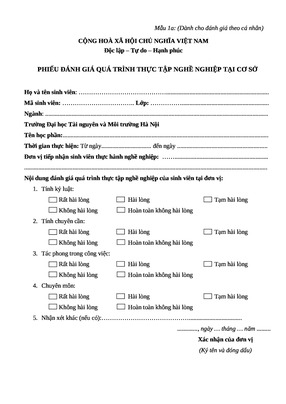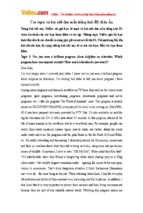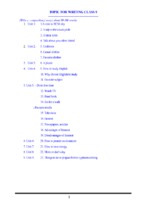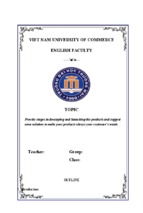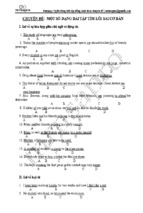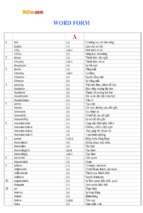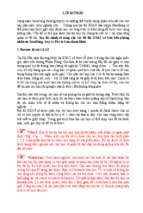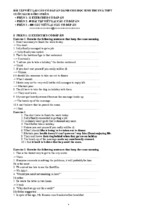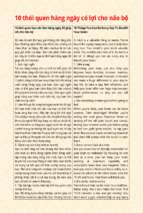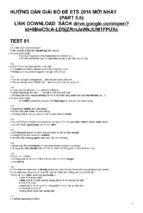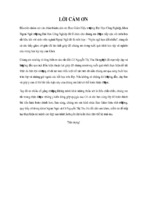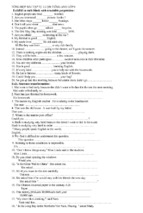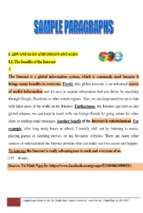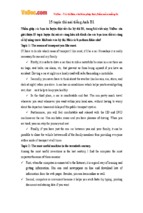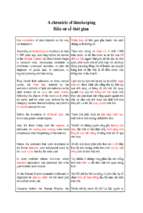How to Win Every
Argument
The Use and Abuse of Logic
Also available from Continuum
What Philosophers Think - Julian Baggini and Jeremy Stangroom
What Philosophy Is - David Carel and David Gamez
Great Thinkers A-Z - Julian Baggini and Jeremy Stangroom
How to Win Every
Argument
The Use and Abuse of Logic
Madsen Pirie
• \ continuum
•
• • L O N D O N
•
NEW
YORK
To Thomas, Samuel and Rosalind
Continuum International Publishing Group
The Tower Building
11 York Road
London
SE1 7NX
15 East 26th Street
New York, NY 10010
© Madsen Pirie 2006
All rights reserved. No part of this publication may be reproduced or transmitted in any
form or by any means, electronic or mechanical, including photocopying, recording, or
any information storage or retrieval system, without prior permission in writing from the
publishers.
Madsen Pirie has asserted his right under the Copyright, Designs and Patents Act, 1988,
to be identified as Author of this work
British Library Cataloguing-in-Publication Data
A catalogue record for this book is available from the British Library.
ISBN: 0826490069 (hardback)
Library of Congress Cataloguing-in-Publication Data
A catalog record for this book is available from the Library of Congress.
Typeset by YHT Ltd, London
Printed and bound in Great Britain by MPG Books Ltd, Bodmin, Cornwall
Contents
Acknowledgments
Introduction
viii
ix
Abusive analogy
1
Accent
3
5
Accident
Affirming the consequent
Amphiboly
7
9
Analogical fallcy
Antiquitam, argumentum ad
11
14
Apriorism
Baculum, argumentum ad
15
17
Bifurcation
19
Blinding with science
The bogus dilemma
22
24
Circulus in probando
The complex question (plurium interrogationum)
27
29
Composition
31
Concealed quantification
Conclusion which denies premises
33
Contradictory premises
38
39
Crumenam, argumentum ad
Cum hoc ergo propter hoc
Damning the alternatives
35
41
44
How to Win Every Argument
VI
Definitional retreat
Denying the antecedent
Dicto simpliciter
46
49
Division
Emotional appeals
53
55
51
Equivocation
58
Every schoolboy knows
60
The exception that proves the rule
63
Exclusive premises
The existential fallacy
65
67
Ex-post-facto statistics
69
Extensional pruning
72
False conversion
False precision
74
The gambler's fallacy
76
79
The genetic fallacy
82
Half-concealed qualification
Hedging
83
Hominem (abusive), argumentum ad
88
Hominem (circumstantial), argumentum ad
Ignorantiam, argumentum ad
90
92
Ignorantio elenchi
94
Illicit process
Irrelevant humour
97
99
Lapidem, argumentum ad
Lazarum, argumentum ad
Loaded words
86
101
104
106
Misericordiam, argumentum ad
109
Nauseam, argumentum ad
Non-anticipation
111
114
Novitam, argumentum ad
116
Numeram, argumentum ad
118
One-sided assessment
Petitio principii
121
123
Contents
Poisoning the well
vu
126
Populum, argumentum ad
128
Positive conclusion from negative premise
Post hoc ergo propter hoc
130
131
Quaternio terminorum
The red herring
133
Refuting the example
Reification
138
The runaway train
Secundum quid
142
136
140
Shifting ground
145
147
Shifting the burden of proof
149
The slippery slope
Special pleading
151
153
The straw man
Temperantiam, argumentum ad
155
157
Thatcher's blame
Trivial objections
160
162
Tu quoque
Unaccepted enthymemes
166
The undistributed middle
168
Unobtainable perfection
171
Verecundiam, argumentum ad
173
Wishful thinking
176
Classification of fallacies
164
179
Acknowledgments
My thanks for their helpful suggestions go to Eamonn Butler and
John O'Sullivan. For assistance with the preparation, I thank Tom
Lees, Steve Masty, Sam Nguyen and Xander Stephenson. I also
thank all those who have aided and encouraged this work, not
least the publisher and editor.
Introduction
Sound reasoning is the basis of winning at argument. Logical
fallacies undermine arguments. They are a source of enduring
fascination, and have been studied for at least two-and-a-half
millennia. Knowledge of them is useful, both to avoid those used
inadvertently by others and even to use a few with intent to
deceive. The fascination and the usefulness which they impart,
however, should not be allowed to conceal the pleasure which
identifying them can give.
I take a very broad view of fallacies. Any trick of logic or language which allows a statement or a claim to be passed off as
something it is not has an admission card to the enclosure
reserved for fallacies. Very often it is the case that what appears
to be a supporting argument for a particular contention does not
support it at all. Sometimes it might be a deduction drawn from
evidence which does not sustain it.
Many of the fallacies are committed by people genuinely
ignorant of logical reasoning, the nature of evidence, or what
counts as relevant material. Others, however, might be committed by persons bent on deception. If there is insufficient force
behind the argument and the evidence, fallacies can add enough
weight to carry them through.
This book is intended as a practical guide for those who wish
to win arguments. It also teaches how to perpetrate fallacies with
mischief at heart and malice aforethought. I have described each
How to Win Every Argument
X
fallacy, given examples of it, and shown why it is fallacious. After
any points of general interest concerning the history or occurrence of the fallacy, I have given the reader recommendations on
how and where the fallacy may be used to deceive with maximum effect.
I have listed the fallacies alphabetically, although a full classification into the five major types of fallacy may be found at the
end of the book. It is well worth the reader's trouble to learn the
Latin tags wherever possible. When an opponent is accused of
perpetrating something with a Latin name it sounds as if he is
suffering from a rare tropical disease. It has the added effect of
making the accuser seem both erudite and authoritative.
In the hands of the wrong person this is more of a weapon
than a book, and it was written with that wrong person in mind.
It will teach such a person how to argue effectively, even dishonestly at times. In learning how to argue, and in the process of
practising and polishing each fallacy, the user will learn how to
identify it and will build up an immunity to it. A working
knowledge of these fallacies provides a vocabulary for talking
about politicians and media commentators. Replacing the vague
suspicion of double-dealing will be the identification of the
precise crimes against logic which have been committed.
Knowledge of fallacies can thus provide a defensive as well as
an offensive capability. Your ability to spot them coming will
enable you to defend yourself against their use by others, and
your own dexterity with them will enable you to be both successful and offensive, as you set about the all-important task of
making arguments go your way.
Madsen Pirie
Abusive analogy
The fallacy of abusive analogy is a highly specialized version of
the ad hominem argument. Instead of the arguer being insulted
directly, an analogy is drawn which is calculated to bring him
into scorn or disrepute. The opponent or his behaviour is compared with something which will elicit an unfavourable response
toward him from the audience.
Smith has proposed we should go on a sailing holiday, though he knows
as much about ships as an Armenian bandleader does.
(Perhaps you do not need to know all that much for a sailing holiday.
Smith can always learn. The point here is that the comparison is
deliberately drawn to make him look ridiculous. There may even be
several Armenian bandleaders who are highly competent seamen.)
The analogy may even be a valid one, from the point of view of
the comparison being made. This makes it more effective, but no
less fallacious, since the purpose is to introduce additional,
unargued, material to influence a judgement.
If science admits no certainties, then a scientist has no more certain
knowledge of the universe than does a Hottentot running through the
bush.
(This is true, but is intended as abuse so that the hearer will be more
sympathetic to the possibility of certain knowledge.)
The fallacy is a subtle one because it relies on the associations
which the audience make from the picture presented. Its perpetrator need not say anything which is untrue; he can rely on
the associations made by the hearer to fill in the abuse. The
abusive analogy is a fallacy because it relies on this extraneous
material to influence the argument.
How to Win Every Argument
2
In congratulating my colleague on his new job, let me point out tha
has no more experience of it than a snivelling boy has on his first day
school.
(Again, true. But look who's doing the snivelling.)
While politicians delight in both abuse and analogies, there
are surprisingly few good uses of the abusive analogy from that
domain. A good one should have an element of truth in its
comparison, and invite abuse by its other associations. All other
things being equal, it is easier to be offensive by making a
comparison which is untrue, than to be clever by using elements
of truth. Few have reached the memorable heights of Daniel
O'Connell's description of Sir Robert Peel:
...a smile like the silver plate on a coffin.
(True, it has a superficial sparkle, but it invites us to think of something rather cold behind it.)
The venom-loaded pens of literary and dramatic critics are
much more promising springs from which abusive analogies can
trickle forth.
He moved nervously about the stage, like a virgin awaiting the Sult
(And died after the first night.)
Abusive analogies take composition. If you go forth without
preparation, you will find yourself drawing from a well-used
stock of comparisons which no longer have the freshness to
conjure up vivid images. Describing your opponents as being like
'straightlaced schoolmistresses' or 'sleazy strip-club owners' will
not lift you above the common herd. A carefully composed piece
of abusive comparison, on the other hand, can pour ridicule on
Accent
3
the best-presented case you could find: 'a speech like a Texas
longhorn; a point here, a point there, but a whole lot of bull in
between'.
Accent
The fallacy of accent depends for its effectiveness on the fact that
the meaning of statements can change, depending on the stress
put on the words. The accenting of certain words or phrases can
give a meaning quite different from that intended, and can add
implications which are not part of the literal meaning:
Light your cigarette.
(Without accent it looks like a simple instruction or invitation.)
Light your cigarette.
(Rather than the tablecloth, or whatever else you feel in the mood to
burn.)
Light your cigarette.
(Instead of everyone else's.)
Light your cigarette.
(Instead of sticking it in your ear.)
Even with so simple a phrase, a changed accent can give a
markedly changed meaning.
We read that men are born equal, but that is no reason for giving them
all an equal vote.
4
How to Win Every Argument
(Actually, we probably read that men are born equal. Born equal
carries an implication that they do not remain equal for long.)
Accent is obviously a verbal fallacy, for the most part.
Emphasis in print is usually given by italics, and those who supply
them to a quotation from someone else are supposed to say so.
In speech, however, unauthorized accents intrude more readily,
bringing unauthorized implications in their wake. The fallacy lies
with the additional implications introduced by emphasis. They
form no part of the statement accepted, and have been brought
in surreptitiously without supporting argument.
The fallacy of accent is often used to make a prohibition more
permissive. By stressing the thing to be excluded, it implies that
other things are admissible.
Mother said we shouldn't throw stones or the windows.
It's all right for us to use these lumps of metal.
(And mother, who resolved never to lay a hand on them, might well
respond with a kick.)
In many traditional stories the intrepid hero wins through to
glory by using the fallacy of accent to find a loophole in some
ancient curse or injunction. Perseus knew that anyone who
looked at the Medusa would be turned to stone. Even villains use
it: Samson was blinded by the king of the Philistines who had
promised not to touch him.
Your most widespread use of the fallacy of accent can be to
discredit opponents by quoting them with an emphasis they
never intended. ('He said he would never lie to the American
people. You will notice all of the things that left him free to do.')
Richelieu needed six lines by the most honest man in order to
find something on which to hang him; with skilful use of the
fallacy of accent you can usually get this down to half a line.
Accident
5
It is particularly useful when you are advocating a course of
action which normally meets with general disapproval. Accent
can enable you to plead that your proposed action is more
admissible. ('I know we are pledged not to engage in germ
warfare against people in far-away lands, but the Irish are not far
away.')
When trying to draw up rules and regulations, bear it in mind
that there are skilled practitioners of the fallacy of accent quite
prepared to drive a coach and six through your intentions. You
will then end up with something as tightly worded as the old
mail monopoly, which actually spelled out that people shouting
across the street could be construed as a breach of the mail
monopoly. (They did only say the street, though.)
Accident
The fallacy of accident supposes that the freak features of an
exceptional case are enough to justify rejection of a general rule.
The features in question may be 'accidental', having no bearing
on the matter under contention, and may easily be identified as
an unusual and allowable exception.
We should reject the idea that it is just to repay what is owed. Supposing
a man lends you weapons, and then goes insane? Surely it cannot be just
to put weapons into the hands of a madman?
(This fallacy, used by Plato, lies in not recognizing that the insanity is
an 'accident', in that it is a freak circumstance unrelated to the central
topic, and readily admitted to be a special case.)
Almost every generalization could be objected to on the
grounds that one could think of 'accidental' cases it did not
cover. Most of the general statements about the consequences
How to Win Every Argument
6
which follow upon certain actions could be overturned on the
grounds that they did not cover the case of a meteorite striking
the perpetrator before the consequences had occurred. To
maintain this would be to commit the fallacy of accident.
It is a fallacy to treat a general statement as if it were an
unqualified universal, admitting no exceptions. To do so is to
invest it with a significance and a rigour which it was never
intended to bear. Most of our generalizations carry an implicit
qualification that they apply, all other things being equal. If other
things are not equal, such as the presence of insanity or a
meteorite, the exceptions can be allowed without overturning
the general claim.
' You say you have never met this spy. Can you be sure he was never near
you in a football crowd, for example?'
'Well, no.'
'When was this occasion, and what papers passed between you?1
(If I did meet him, it was an accident.)
Accident is a fallacy encountered by those in pursuit of universal. If you are trying to establish watertight definitions of
things like 'truth', justice' and 'meaning', you must not be surprised if others spend as much energy trying to leak the odd
accident through your seals.
Plato was searching for justice. John Stuart Mill, trying to
justify liberty except where there is harm, or serious risk of harm,
to others, found himself forever meeting objections which
began, 'But what about the case where . . . ? ' It is an occupational
hazard. If you are to avoid accidents, avoid universal.
Promises should not always be kept. Suppose you were stranded on a
desert island with an Austrian count who was running an international
- Xem thêm -

